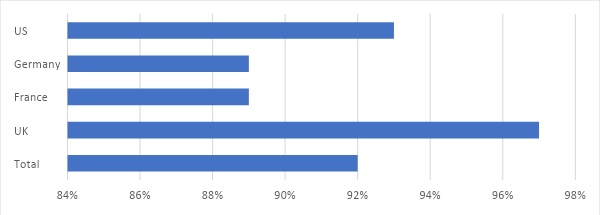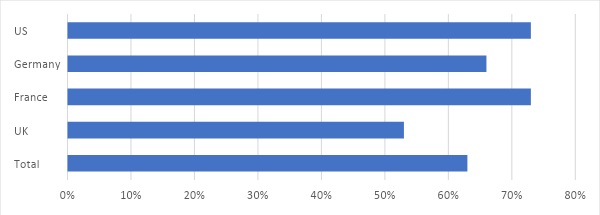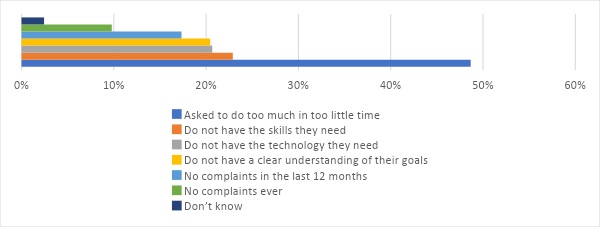webAI and MacStadium(link is external) announced a strategic partnership that will revolutionize the deployment of large-scale artificial intelligence models using Apple's cutting-edge silicon technology.
While we all hope the stresses of 2020 will be quickly put behind us, there are also some solid encouraging signs on the horizon. Looking at Couchbase's annual IT decision makers survey results reveals both the pain and the optimism around development projects.
Digital Transformation (DX) Projects were top of mind as companies quickly scrambled to get them into operation faster than scheduled. How does one cram five-year DX plans into less than one year? By leaning on the superpowers of developer teams in new and more flexible ways!
450 senior leaders and CIOs were surveyed in 2020, and 92% of them revealed that developers were their weapon to adjust to unprecedented market changes. In this report they acknowledged that developers were the heroes of their corporate stories.
Here is a finer breakdown by country:

Over 60% of all respondents (over 70% in US and France) acknowledged that flexibility of developer teams was essential.
Has the flexibility to change goals when needed been significantly helpful or indispensable in meeting digital transformation goals? — by country:

Understanding Developer Pressures
This rejuvenated view of developer power also meant that companies had to really listen to these heroes to ensure they had what they needed to prosper in their work. When asked about the challenges they face as development teams, the overwhelming response (49%) pointed to time pressures — "Asked to do too much in too little time."
Notably, other challenges such as skills, technology, project clarity were only around 20% of reported complaints — so it seems that some of the most basic needs may be well taken care of while the neverending demands to do more in less time remain.
Oddly, some respondents said they received no complaints "ever" or at least not "in the last 12 months." I think we all want to find the kind of workplace where needs are met that well, if true!
To see some of the different country dynamics, review the original report here.
Developer complaints:

From the other side of the relationship, how did companies view the performance of developers and their hyper-speed project plans?
The question asked CIOs how the schedule challenges were going. The results were surprising for me to see that a majority of projects appeared to be on schedule in most regions.
Are development teams ahead or behind schedule?

Size of Development Teams
I'd love to know more about what's going in the UK that they appear to be further behind than others. Perhaps this closing question helps to answer that. Respondents reveal how the size of their development teams have changed. On average, teams have grown globally by 20% but consider that the UK apparently was dragging that number down considerably.
The average change in development team size:

While 2021 won't make all the challenges and pressure magically disappear, there are several other great observations in the details of the report that hint at what is needed.
If there is to be a moral to this story, it would sound something like: "With increased project pressure, be very clear on expectations while supporting and growing development teams, or risk not keeping up with market demands."
Industry News
Development work on the Linux kernel — the core software that underpins the open source Linux operating system — has a new infrastructure partner in Akamai. The company's cloud computing service and content delivery network (CDN) will support kernel.org, the main distribution system for Linux kernel source code and the primary coordination vehicle for its global developer network.
Komodor announced a new approach to full-cycle drift management for Kubernetes, with new capabilities to automate the detection, investigation, and remediation of configuration drift—the gradual divergence of Kubernetes clusters from their intended state—helping organizations enforce consistency across large-scale, multi-cluster environments.
Red Hat announced the latest updates to Red Hat AI, its portfolio of products and services designed to help accelerate the development and deployment of AI solutions across the hybrid cloud.
CloudCasa by Catalogic announced the availability of the latest version of its CloudCasa software.
BrowserStack announced the launch of Private Devices, expanding its enterprise portfolio to address the specialized testing needs of organizations with stringent security requirements.
Chainguard announced Chainguard Libraries, a catalog of guarded language libraries for Java built securely from source on SLSA L2 infrastructure.
Cloudelligent attained Amazon Web Services (AWS) DevOps Competency status.
Platform9 formally launched the Platform9 Partner Program.
Cosmonic announced the launch of Cosmonic Control, a control plane for managing distributed applications across any cloud, any Kubernetes, any edge, or on premise and self-hosted deployment.
Oracle announced the general availability of Oracle Exadata Database Service on Exascale Infrastructure on Oracle Database@Azure(link sends e-mail).
Perforce Software announced its acquisition of Snowtrack.
Mirantis and Gcore announced an agreement to facilitate the deployment of artificial intelligence (AI) workloads.
Amplitude announced the rollout of Session Replay Everywhere.
Oracle announced the availability of Java 24, the latest version of the programming language and development platform. Java 24 (Oracle JDK 24) delivers thousands of improvements to help developers maximize productivity and drive innovation. In addition, enhancements to the platform's performance, stability, and security help organizations accelerate their business growth ...








